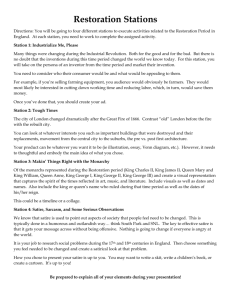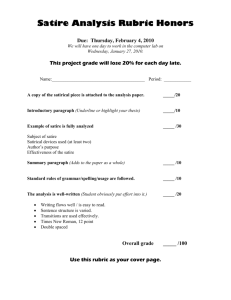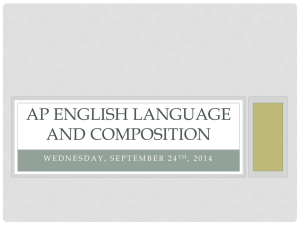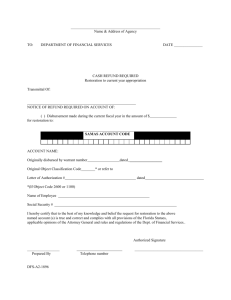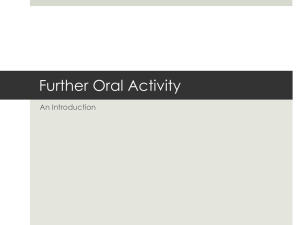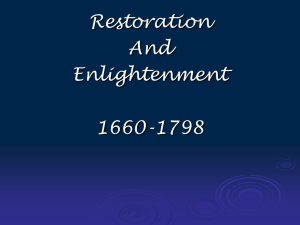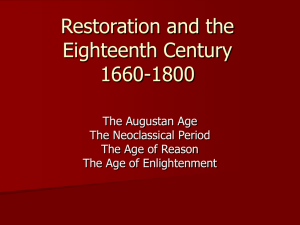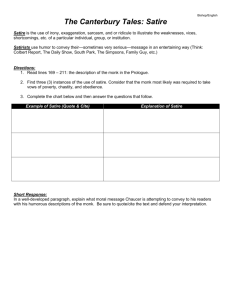Restoration Period Web Quest Introduction The Restoration period
advertisement
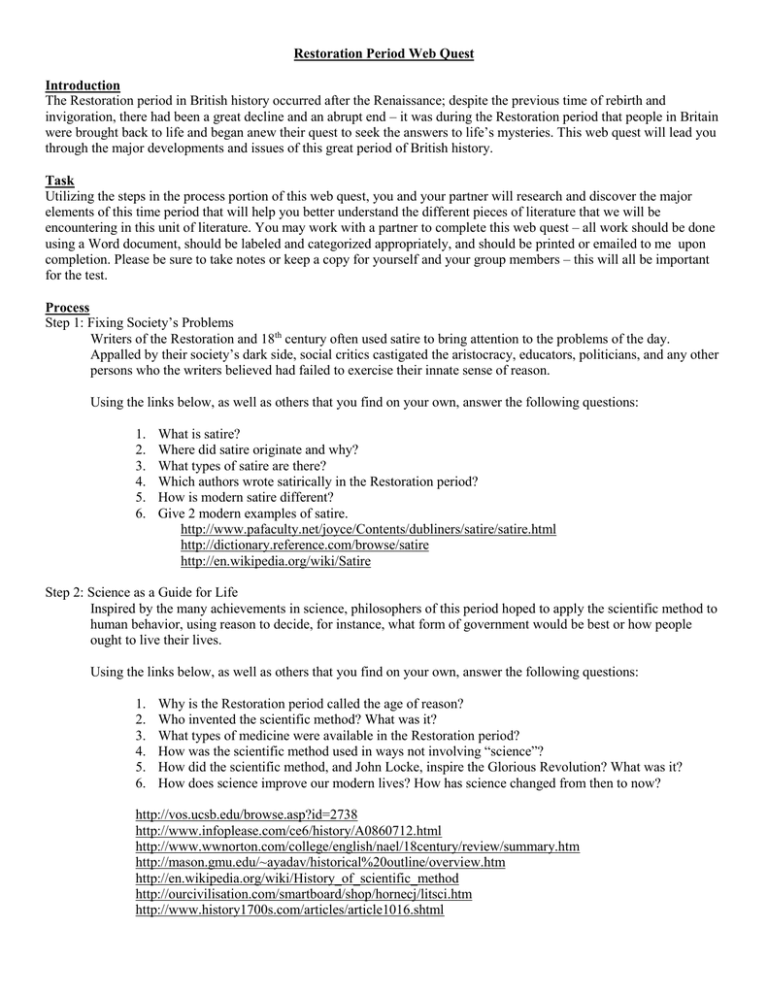
Restoration Period Web Quest Introduction The Restoration period in British history occurred after the Renaissance; despite the previous time of rebirth and invigoration, there had been a great decline and an abrupt end – it was during the Restoration period that people in Britain were brought back to life and began anew their quest to seek the answers to life’s mysteries. This web quest will lead you through the major developments and issues of this great period of British history. Task Utilizing the steps in the process portion of this web quest, you and your partner will research and discover the major elements of this time period that will help you better understand the different pieces of literature that we will be encountering in this unit of literature. You may work with a partner to complete this web quest – all work should be done using a Word document, should be labeled and categorized appropriately, and should be printed or emailed to me upon completion. Please be sure to take notes or keep a copy for yourself and your group members – this will all be important for the test. Process Step 1: Fixing Society’s Problems Writers of the Restoration and 18th century often used satire to bring attention to the problems of the day. Appalled by their society’s dark side, social critics castigated the aristocracy, educators, politicians, and any other persons who the writers believed had failed to exercise their innate sense of reason. Using the links below, as well as others that you find on your own, answer the following questions: 1. 2. 3. 4. 5. 6. What is satire? Where did satire originate and why? What types of satire are there? Which authors wrote satirically in the Restoration period? How is modern satire different? Give 2 modern examples of satire. http://www.pafaculty.net/joyce/Contents/dubliners/satire/satire.html http://dictionary.reference.com/browse/satire http://en.wikipedia.org/wiki/Satire Step 2: Science as a Guide for Life Inspired by the many achievements in science, philosophers of this period hoped to apply the scientific method to human behavior, using reason to decide, for instance, what form of government would be best or how people ought to live their lives. Using the links below, as well as others that you find on your own, answer the following questions: 1. 2. 3. 4. 5. 6. Why is the Restoration period called the age of reason? Who invented the scientific method? What was it? What types of medicine were available in the Restoration period? How was the scientific method used in ways not involving “science”? How did the scientific method, and John Locke, inspire the Glorious Revolution? What was it? How does science improve our modern lives? How has science changed from then to now? http://vos.ucsb.edu/browse.asp?id=2738 http://www.infoplease.com/ce6/history/A0860712.html http://www.wwnorton.com/college/english/nael/18century/review/summary.htm http://mason.gmu.edu/~ayadav/historical%20outline/overview.htm http://en.wikipedia.org/wiki/History_of_scientific_method http://ourcivilisation.com/smartboard/shop/hornecj/litsci.htm http://www.history1700s.com/articles/article1016.shtml Step 3: Newsworthy Topics Eighteenth-century writers Joseph Addison and Richard Steele changed the nature of news with their periodicals The Tatler and The Spectator. Often gossipy in character, the periodicals examined contemporary manners and customs as well as more serious subjects. Using the links below, as well as others that you find on your own, answer the following questions: 1. What type of literature was popular to the reading public of the Restoration period? 2. How did censorship originate in the Restoration period? 3. Who were Joseph Addison and Richard Steele? 4. Describe The Tatler. 5. Describe The Spectator. 6. How do the newspapers of the Restoration period compare to our newspapers? http://www.aboutenglish.it/englishpress/tatler.htm http://www.lib.uchicago.edu/e/su/news/18thcentury.html http://bartleby.com/219/0218.html http://en.wikipedia.org/wiki/The_Spectator_%281711%29 http://en.wikipedia.org/wiki/Tatler Step 4: Specific Historical Events (only for study purposes) Throughout our study for the Restoration literature, you will encounter various historical topics that require some background information. Using your textbook (490) as well as any web sources that you find on your own, answer the following questions: 1. Why is this period called the “Restoration”? 2. Who is James II (Stuart line)? 3. Who are William and Mary (Stuart line)? 4. How did language change or improve during this period? 5. What is the literary style of this period? 6. What is Neoclassicism? 7. Who is Samuel Pepys? 8. Who is Daniel Defoe? 9. Who is Joseph Addison? 10. Who is Alexander Pope? 11. Who is Jonathan Swift? 12. Who was Mary Wollstonecraft? 13. What was the Great Fire of London? 14. What was happening in Ireland in 1729 ?
